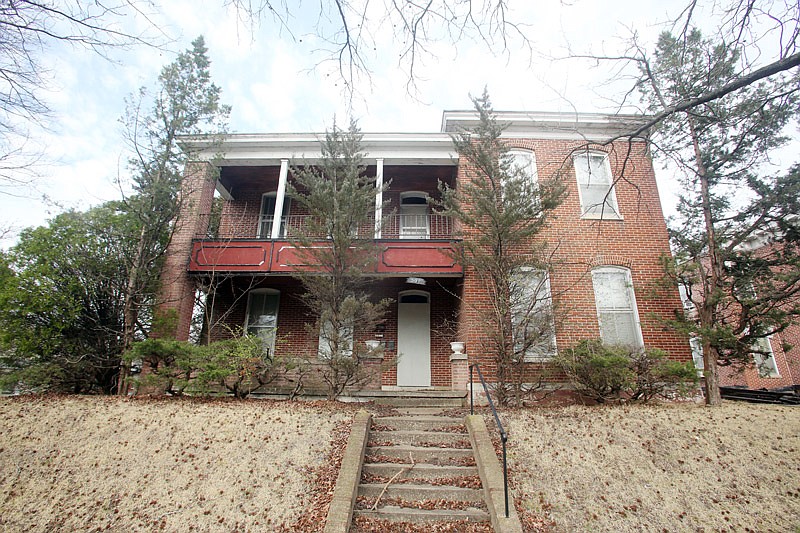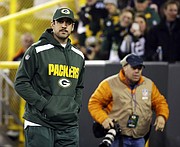The first seven properties in the East Capitol Avenue Urban Renewal area already have been appraised.
The first five - 103 Jackson St., 108 Jackson St., 500 E. Capitol Ave., 401 E. Capitol Ave. (profiled Jan. 29 on NewsTribune.com) and 105 Jackson St. - were chosen after receiving the most public input.
Two more - 101 Jackson and 501 E. Capitol Ave. - were added later at the suggestion of city staff. Here are their stories.
--
501 Capitol Avenue
The son of Scottish immigrants who found prominence in the lumber business across the Midwest, Edwin Hogg likely built 501 Capitol Ave.
The corner property was built about 1895, according to the Jefferson City Historic East survey. The house was converted into three apartments in 1930 by T.H. Irwin.
The National Register of Historic Places nomination for the Capitol Avenue Historic District calls this two-story brick home the C.H. Colley House.
Charles Colley, a Pulaski County native, lived in Jefferson City eight years while employed under Secretary of State Cornelius Roach, a 1920 Daily Capital News said.
However, local historian Jane Beetem said she does not know the source of that name.
Hogg, on the other hand, was named in the 1906 "Book of Missourians" by M. L. Van Nada as living at the corner of Main and Jackson streets.
Twice a president of the Commercial Club, Hogg was born in 1863 in Hannibal, where he worked at his father's planing mill before moving to Kansas to work at a lumber yard. Through the 1880s, he was a traveling lumber salesman for the John Cruikshank company before moving to Jefferson City.
He bought Capt. J.L. Keown's lumber yard on High Street in 1893 and married Maude McHenry in 1895. Sons, Ed junior, and Jack were born in Jefferson City in 1896 and 1898, respectively.
In 1902, he sold his Jefferson City business to work for the H.C. McDaniel Lumber Company, in Wesson, Arkansas. But, he soon returned to Jefferson City, where he organized the Ed R. Hogg Lumber Company at 113 E. Main St.
By 1905, he had bought the R.H. Dallmeyer lumber company.
"Mr. Hogg is one of the best posted man in the lumber business in Missouri and will give people who buy from him the benefit of his long experience in the business," the Sept. 15, 1905, Cole County Democrat said.
He served on the first board of directors of the Mutual Building and Loan Association in 1906.
Before he moved his family, including two sons, Ed junior and Jack, to Seattle, Washington, in 1910, Hogg also was involved in establishing Riverview Cemetery.
Van Nada called him: "a public spirited progressive man and one who lends his influence to every movement to forward the interests of the city of his adoption."
A beloved philanthropist, Mary McMillen Gordon Hendy, owned 501 Capitol Ave. before 1930, when she sold to T.H. Irwin.
Mrs. Hendy was born in Kentucky in 1843 to Capt. Samuel McMillen, a distinguished soldier in the Mexican War, and to the sister of Gen. Sam Houston.
She married John Gordon, a prominent contractor and wealthy cattle dealer, who died about 1899.
At the age of 60, she married secondly the Rev. John Fenton Hendy, a well-known minister and recently retired from First Presbyterian Church in 1907.
She "was a woman of strong character, the personification of poise and grace. She was known for her splendid hospitality and for her many philanthropies," the Jefferson City Post Tribune said after her death in 1931.
T.H. Irwin and his family lived on the lower floor of 501 Capitol Ave. while renting the upstairs two apartments for more than 30 years. Irwin worked for the state highway commission, was a mason for more than 60 years and died in 1967.
--
101 Jackson Street
The only full-time rabbi ever employed at Temple Beth El lived at 101 Jackson St. with his family for just more than one year.
Rabbi Carl Schorr arrived just before the Feast of Chanukah in December 1935 to serve a congregation of about 30, when Max Meyerhardt was president and they had designs of expansion.
He came from a congregation in Monroe, Louisiana, to "be the first permanent rabbi to serve the local church since its organization in 1882," the Dec. 18, 1935, Jefferson City Post Tribune reported.
Schorr studied in Europe and graduated from Edelmons Jewish Theological Seminary in New York and was ordained in 1917. He was an active Mason and Shriner.
He brought his wife, Lillian, and their two children, Sheldon and Richard, and his mother, Anna.
Schorr was born to "one of the best know Jewish ministers in this part of the country," according to the Lima News in Ohio in 1917.
His parents were Rabbi Saul and Anna Schorr, who immigrated to the United States in 1890 from Russia, though they were Austrian born in Romania and Hungary.
When Schorr was 6 years old, the family moved to Canada. But, were in Ft. Wayne, Indiana, before 1917.
The Schorr family also was highly musical. Schorr wrote his own compositions for services.
In the 1920s, he served congregations in North Carolina, Texas, Michigan, Pennsylvania and Louisiana.
He had left the Jefferson City congregation before the High Holidays in the fall of 1937, according to the research of Ann Tettlebaum.
Before then and since, the congregation has been served by visiting rabbi, student rabbis and lay leaders.
The duplex at 101 Jackson St., where the Schorr family stayed for its time in the Capital City, was built about 1910, according to Jane Beetem.
"Despite alterations to the porch supports and railings, this building retains a significant degree of integrity and is a contributing resource," the Capitol Avenue District nomination to the National Register of Historic Places said of the Georgian Revival-inspired American Four Square.
Only one other property of that architecture remains in the Capitol Avenue area - 504 State St.
Others who made their home in the duplex during the property's century, include Dr. V. H. McCue, vice-chairman of the State Board of Pardon; Dr. G. L. McCrutchan, physician at the nearby Missouri State Penitentiary; and Edward Thiers, a traveling auditor for half a century with the Missouri Pacific Railroad, and his wife Florence.


